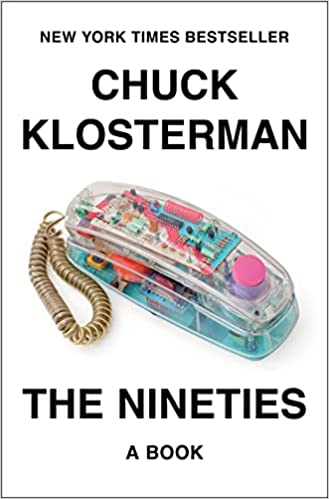Tyler Cipriani reviewed The Nineties by Chuck Klosterman
It was both good and hard to enjoy
3 stars
I enjoy Chuck Klosterman. In college, I devoured his essay collection: “Sex, Drugs, and Cocoa Puffs.” And Klosterman’s new collection of essays lingers somewhere between fine and likable, depending on the topic.
Many of the significant events in the book are better covered elsewhere: the OJ Simpson trial, the Clinton administration, and the 2000 election of George W Bush.
But the collection shines in its excursions into pop-esoterica—for example, the discussion of “selling out,” framed by Nirvana’s 1991 album Nevermind and the 1994 Winona Ryder, Ethan Hawke, and Ben Stiller film Reality Bytes.
It’s an isolated, freestanding period where a person’s unwillingness to view his existence as a commodity was prioritized over another person’s actual personality. An authentic jerk was preferable to a likeable sellout. It was a confusing time to care about things.
-- Chuck Klosterman, The Nineties
And Crystal Pepsi
There’s no evidence that people of the …
I enjoy Chuck Klosterman. In college, I devoured his essay collection: “Sex, Drugs, and Cocoa Puffs.” And Klosterman’s new collection of essays lingers somewhere between fine and likable, depending on the topic.
Many of the significant events in the book are better covered elsewhere: the OJ Simpson trial, the Clinton administration, and the 2000 election of George W Bush.
But the collection shines in its excursions into pop-esoterica—for example, the discussion of “selling out,” framed by Nirvana’s 1991 album Nevermind and the 1994 Winona Ryder, Ethan Hawke, and Ben Stiller film Reality Bytes.
It’s an isolated, freestanding period where a person’s unwillingness to view his existence as a commodity was prioritized over another person’s actual personality. An authentic jerk was preferable to a likeable sellout. It was a confusing time to care about things.
-- Chuck Klosterman, The Nineties
And Crystal Pepsi
There’s no evidence that people of the nineties wanted clear versions of beverages that were readily available in non-clear form.
-- Chuck Klosterman, The Nineties
And Alanis Morissette's "Jagged Little Pill":
It epitomized the long-standing complaint that a male artist’s experience is seen as universal while any female experience is inexorably viewed as personal—instead of becoming a song about breakups, it became a song about this specific breakup.
-- Chuck Klosterman, The Nineties
One tricky part of reading all these essays back-to-back was that Klosterman's Formula™ started to leap out and distract me:
- Introduce a topic
- Say there are 𝑛 important things about this topic (where 𝑛 is usually 2 or 3)
- "And this is both [some easy-to-guess adjective] and [some hard-to-guess adjective]."
For example, on the OJ Simpson white bronco TV chase:
Now, the two things most remembered about this spectacle are (a) the seemingly insane people standing along the highway who witnessed the chase in person, and (b) the insane number of television viewers who watched the chase from the comfort of their own living rooms. It is the defining night of the nineties and a phenomenon that is somehow both difficult to understand and entirely unsurprising.
-- Chuck Klosterman, The Nineties
The "both" thing grated on me. All real examples:
- "both famous and incorrect"
- "both explicable and debatable"
- "both ubiquitous and impossible to grasp"
- "both upbeat and devistating"
- "both stock and singular"
- "both conformist and unpredictable"
- "both world-shattering and predictable"
The ideal audience for a Klosterman book is someone who is incredibly shallow in the deepest way possible. Someone who is both both a pop culture aficionado and an irredeemable pedant.
See? Now that’s a Klosterman Formula™ ending!

